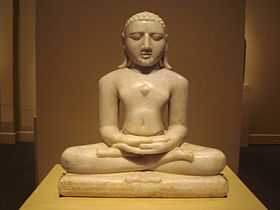Ādi purāṇa

Adipurana is a 10th-century Kannada text written in Champu style, a mix of prose and verse, dealing with the ten lives of the first tirthankara, Adinatha, also known as Rishabhanatha . This work is known to be the first work of Kannada poet Adikavi Pampa (941 CE). It is based on the story narrated by Jinasenacharya in his earlier Sanskrit work Purvapurana. Vikramarjuna Vijaya and Adipurana are, in some respects, comparable to Milton's Paradise Lost and Paradise Regained.
A court poet of Chalukya King Arikesari II, a Rashtrakuta feudatory, he is most known for his epics, Vikramarjuna Vijaya (Pampa Bharata) and Adipurana, both written in Champu style, which he created and served as the model for all future works in the Kannada. The works of Jain writers Adikavi Pampa, Sri Ponna and Ranna, collectively called the "three gems of Kannada literature", heralded the age of classical Kannada in the 10th century, the Medieval Kannada literature.[1]
Content
Adipurana written in Champu style, a mixed form of prose and verse is a Kannada version of the Sanskrit work by Jinasena and details the life of Rishabha, the first Tirthankara of Jainism, in sixteen cantos. The work focusses in his own unique style the pilgrimage of a soul to perfection and attainment of mukti. In the work, Pampa describes the struggle for power and control over the entire world of two brothers Bharata and Bahubali, sons of Vrishabhadeva. While Bahubali wins, he renounces the worldly pursuits in favor of his brother. Many Jaina Puranas of the Middle Ages found a role model in this work.
Famous quote
A famous quote from Adi Purana is-
| “ | By birth are all men equal unto one another; but they differ in respect of the progress they might make on the spiritual path. | ” |
Notes
- ↑ Students' Britannica India, Volumes 1-5. Popular Prakashan. p. 78. ISBN 0-85229-760-2.
- ↑ Jain 2008, p. 111.
References
- Adipurana 1, Bhartiya Jnanpith, ISBN 978-81-263-1604-5
- Adipurana 2, Bhāratīya Jñānapīṭha, 2007, ISBN 978-81-263-0922-1
- Adipurana, Eastern Book Linkers, ISBN 978-81-785-4202-7
- Jain, Champat Rai (2008). "XI: Bahubali". Risabha Deva - The Founder of Jainism. Bhagwan Rishabhdeo Granth Mala. ISBN 978-8177720228.